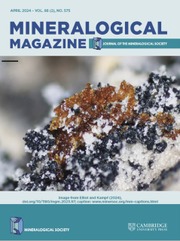Crossref Citations
This article has been cited by the following publications. This list is generated based on data provided by
Crossref.
Bacon, Charles R.
and
Metz, Jenny
1984.
Magmatic inclusions in rhyolites, contaminated basalts, and compositional zonation beneath the Coso volcanic field, California.
Contributions to Mineralogy and Petrology,
Vol. 85,
Issue. 4,
p.
346.
Bacon, Charles R.
1986.
Magmatic inclusions in silicic and intermediate volcanic rocks.
Journal of Geophysical Research: Solid Earth,
Vol. 91,
Issue. B6,
p.
6091.
Frolova, T. I.
Bindeman, I. N.
Mahmoud, Mustafa
and
Bailey, J. C.
1992.
MELANOCRATIC INCLUSIONS IN ANDESITES AND DACITES OF THE KURILE-KAMCHATKA VOLCANIC ARC.
International Geology Review,
Vol. 34,
Issue. 2,
p.
119.
Bailey, John C.
and
Rasmussen, Mogens H.
1997.
Petrochemistry of Jurassic and Cretaceous tholeiites from Kong Karls Land, Svalbard, and their relation to Mesozoic magmatism in the Arctic.
Polar Research,
Vol. 16,
Issue. 1,
p.
37.
BAILEY, JOHN C.
and
RASMUSSEN, MOGENS H.
1997.
Petrochemistry of Jurassic and Cretaceous tholeiites from Kong Karls Land, Svalbard, and their relation to Mesozoic magmatism in the Arctic.
Polar Research,
Vol. 16,
Issue. 1,
p.
37.
Hammer, J.E.
Cashman, K.V.
and
Voight, B.
2000.
Magmatic processes revealed by textural and compositional trends in Merapi dome lavas.
Journal of Volcanology and Geothermal Research,
Vol. 100,
Issue. 1-4,
p.
165.
Hammer, Julia E.
and
Rutherford, Malcolm J.
2002.
An experimental study of the kinetics of decompression‐induced crystallization in silicic melt.
Journal of Geophysical Research: Solid Earth,
Vol. 107,
Issue. B1,
Kohut, Edward
and
Nielsen, Roger L.
2004.
Melt inclusion formation mechanisms and compositional effects in high-An feldspar and high-Fo olivine in anhydrous mafic silicate liquids.
Contributions to Mineralogy and Petrology,
Vol. 147,
Issue. 6,
p.
684.
Martin, Victoria M.
Holness, Marian B.
and
Pyle, David M.
2006.
Textural analysis of magmatic enclaves from the Kameni Islands, Santorini, Greece.
Journal of Volcanology and Geothermal Research,
Vol. 154,
Issue. 1-2,
p.
89.
Feeley, T.C.
Wilson, L.F.
and
Underwood, S.J.
2008.
Distribution and compositions of magmatic inclusions in the Mount Helen dome, Lassen Volcanic Center, California: Insights into magma chamber processes.
Lithos,
Vol. 106,
Issue. 1-2,
p.
173.
Brugger, Carrie R.
and
Hammer, Julia E.
2010.
Crystallization Kinetics in Continuous Decompression Experiments: Implications for Interpreting Natural Magma Ascent Processes.
Journal of Petrology,
Vol. 51,
Issue. 9,
p.
1941.
Meneghini, F.
Di Toro, G.
Rowe, C.D.
Moore, J.C.
Tsutsumi, A.
and
Yamaguchi, A.
2010.
Record of mega-earthquakes in subduction thrusts: The black fault rocks of Pasagshak Point (Kodiak Island, Alaska).
Geological Society of America Bulletin,
Vol. 122,
Issue. 7-8,
p.
1280.
Shea, Thomas
and
Hammer, Julia E.
2013.
Kinetics of cooling- and decompression-induced crystallization in hydrous mafic-intermediate magmas.
Journal of Volcanology and Geothermal Research,
Vol. 260,
Issue. ,
p.
127.
Preece, Katie
Barclay, Jenni
Gertisser, Ralf
and
Herd, Richard A.
2013.
Textural and micro-petrological variations in the eruptive products of the 2006 dome-forming eruption of Merapi volcano, Indonesia: Implications for sub-surface processes.
Journal of Volcanology and Geothermal Research,
Vol. 261,
Issue. ,
p.
98.
Ujiie, Kohtaro
and
Kimura, Gaku
2014.
Earthquake faulting in subduction zones: insights from fault rocks in accretionary prisms.
Progress in Earth and Planetary Science,
Vol. 1,
Issue. 1,
p.
7.
Cooper, George F.
and
Wilson, Colin J.N.
2014.
Development, mobilisation and eruption of a large crystal-rich rhyolite: The Ongatiti ignimbrite, New Zealand.
Lithos,
Vol. 198-199,
Issue. ,
p.
38.
Arzilli, Fabio
Mancini, Lucia
Voltolini, Marco
Cicconi, Maria Rita
Mohammadi, Sara
Giuli, Gabriele
Mainprice, David
Paris, Eleonora
Barou, Fabrice
and
Carroll, Michael R.
2015.
Near-liquidus growth of feldspar spherulites in trachytic melts: 3D morphologies and implications in crystallization mechanisms.
Lithos,
Vol. 216-217,
Issue. ,
p.
93.
Paredes-Mariño, Joali
Dobson, Katherine J.
Ortenzi, Gianluigi
Kueppers, Ulrich
Morgavi, Daniele
Petrelli, Maurizio
Hess, Kai-Uwe
Laeger, Kathrin
Porreca, Massimiliano
Pimentel, Adriano
and
Perugini, Diego
2017.
Enhancement of eruption explosivity by heterogeneous bubble nucleation triggered by magma mingling.
Scientific Reports,
Vol. 7,
Issue. 1,
Bazhan, I.S.
Ozawa, Shin
Miyahara, M.
Ohtani, E.
and
Litasov, K.D.
2017.
“Spherulite-like” jadeite growth in shock-melt veins of the Novosibirsk H5/6 chondrite.
Russian Geology and Geophysics,
Vol. 58,
Issue. 1,
p.
12.
Vernon, Ron H.
2018.
A Practical Guide to Rock Microstructure.


